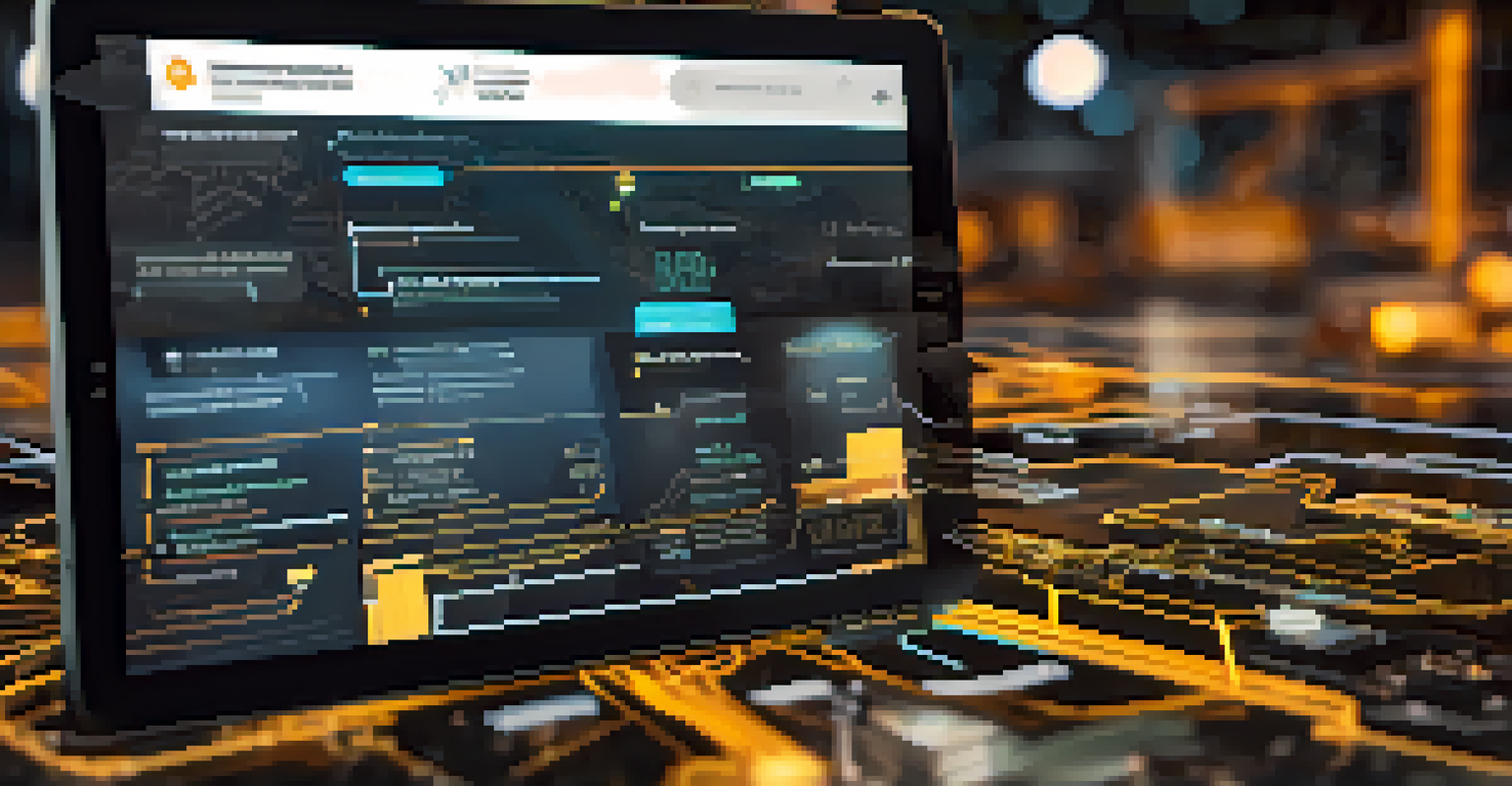Decentralizing Supply Chain Data with Blockchain Solutions

Understanding Blockchain Technology in Supply Chains
Blockchain technology is often associated with cryptocurrencies, but its potential extends far beyond that. At its core, blockchain is a decentralized ledger that records transactions securely and transparently. This characteristic makes it particularly useful for supply chains, where trust and traceability are paramount.
Blockchain is the tech. Bitcoin is merely the first mainstream manifestation of its genius.
In a traditional supply chain, data is often siloed within organizations, leading to inefficiencies and a lack of transparency. Blockchain addresses this issue by allowing all parties involved to access the same data in real-time. This means that everyone, from manufacturers to consumers, can verify the authenticity of products and their journey through the supply chain.
Imagine a world where you could trace the origin of your food or the manufacturing history of your electronics at the touch of a button. With blockchain, this is not just a dream; it’s a tangible reality that can enhance accountability and trust in supply chains.
Benefits of Decentralizing Supply Chain Data
Decentralizing supply chain data through blockchain can lead to numerous benefits for businesses. First and foremost, it enhances transparency. When all participants can view the same information, it reduces the risk of fraud and errors, leading to more reliable operations.

Another significant advantage is improved efficiency. By automating processes through smart contracts—self-executing contracts with the terms directly written into code—companies can reduce delays caused by paperwork and manual approval processes. This can lead to faster transactions and lower operational costs.
Blockchain Enhances Supply Chain Trust
By providing a decentralized ledger, blockchain ensures transparency and traceability, allowing all parties to verify product authenticity.
Additionally, decentralization empowers stakeholders by giving them control over their data. Instead of relying on a central authority, businesses can make decisions based on data they trust, fostering a more collaborative environment and driving innovation.
Real-World Applications of Blockchain in Supply Chains
Several companies are already harnessing the power of blockchain to optimize their supply chains. For instance, Walmart uses blockchain technology to trace the origin of food products, allowing them to respond quickly to food safety issues. This not only protects consumers but also enhances their brand reputation.
The biggest risk is not taking any risk. In a world that is changing really quickly, the only strategy that is guaranteed to fail is not taking risks.
Another example is De Beers, which employs blockchain to track the provenance of diamonds, ensuring that these gems are ethically sourced. By providing transparency in the diamond supply chain, they help combat conflict diamonds and assure consumers of their purchases’ authenticity.
These real-world applications demonstrate that blockchain is not just a theoretical concept; it’s a practical solution helping businesses navigate complex supply chains while promoting ethical practices.
Challenges in Implementing Blockchain Solutions
Despite its many advantages, implementing blockchain solutions in supply chains isn't without challenges. One of the main hurdles is the initial investment required for technology and infrastructure. Companies must weigh the benefits against the costs of transitioning to a new system.
Moreover, interoperability is another significant concern. Different organizations often use various systems and technologies, making it essential for these systems to communicate effectively with one another. Without standardization, the potential benefits of blockchain can be diminished.
Smart Contracts Streamline Processes
Smart contracts automate agreements between parties, reducing the need for intermediaries and expediting transactions.
Finally, there’s the issue of regulatory compliance. As blockchain is still a relatively new technology, regulations surrounding its use are still evolving. Businesses must stay informed and ensure they are compliant with any legal requirements to avoid potential pitfalls.
The Role of Smart Contracts in Supply Chain Management
Smart contracts are a game changer for supply chain management, allowing for automated, self-executing agreements between parties. These contracts automatically enforce the terms of an agreement when predetermined conditions are met, effectively reducing the need for intermediaries.
For example, a smart contract could automatically release payment to a supplier once goods have been delivered and verified. This not only speeds up the transaction process but also minimizes the risk of disputes and misunderstandings.
By leveraging smart contracts, businesses can streamline their operations, cut costs, and foster stronger relationships with their partners, ultimately enhancing the overall efficiency of the supply chain.
The Future of Decentralized Supply Chains
The future of decentralized supply chains looks promising as more companies recognize the potential of blockchain technology. As the technology matures, we can expect to see wider adoption across various industries, leading to enhanced transparency and efficiency.
Companies are likely to integrate blockchain with other technologies, such as the Internet of Things (IoT), to create even more robust supply chain solutions. For instance, IoT devices can provide real-time data on product conditions, while blockchain ensures the data's integrity.
Future Trends in Decentralized Supply Chains
The integration of blockchain with technologies like IoT promises to enhance supply chain efficiency and sustainability.
Ultimately, as businesses continue to embrace innovation, decentralized supply chains powered by blockchain could redefine how goods are produced, tracked, and delivered, paving the way for a more sustainable and resilient future.
Getting Started with Blockchain Solutions
If you're considering integrating blockchain into your supply chain, it's essential to start with a clear strategy. Begin by identifying specific pain points within your current supply chain processes that blockchain could address. This targeted approach ensures that your implementation is both practical and effective.
Next, collaborate with technology partners who specialize in blockchain solutions. Their expertise can guide you through the process, from choosing the right platform to training your staff. This partnership can significantly enhance the chances of a successful implementation.

Finally, be prepared for ongoing evaluation and adaptation. The world of blockchain is rapidly evolving, and staying agile will allow your business to reap the long-term benefits of this innovative technology.